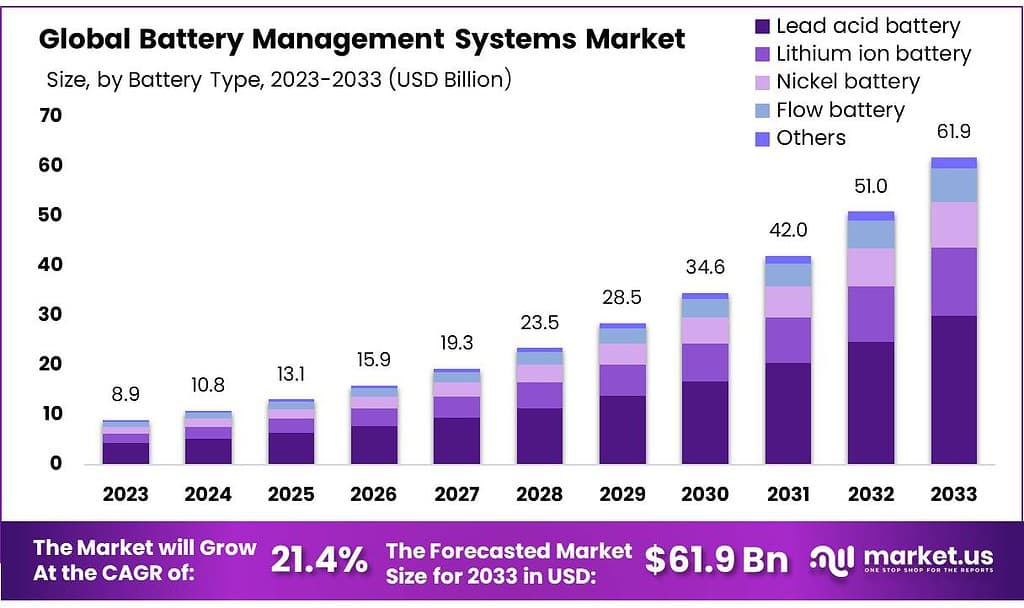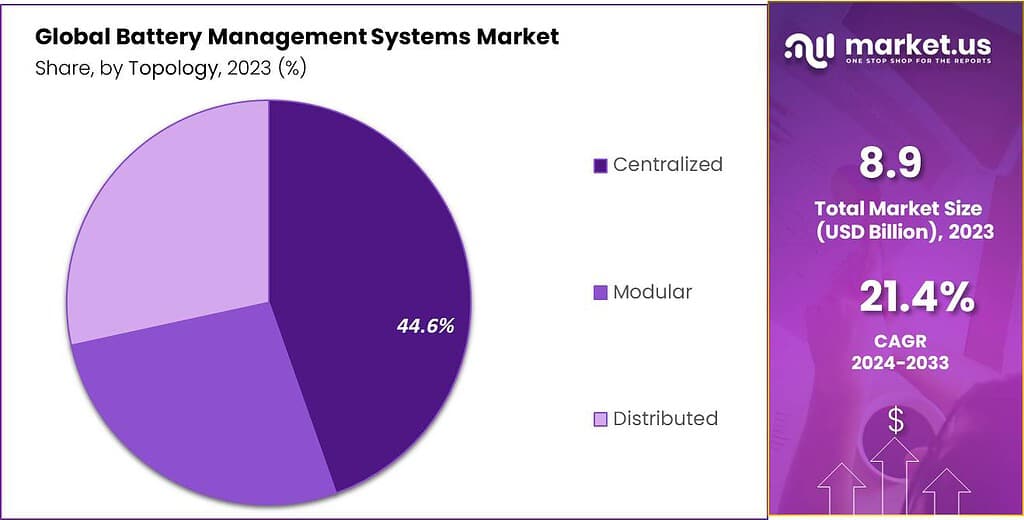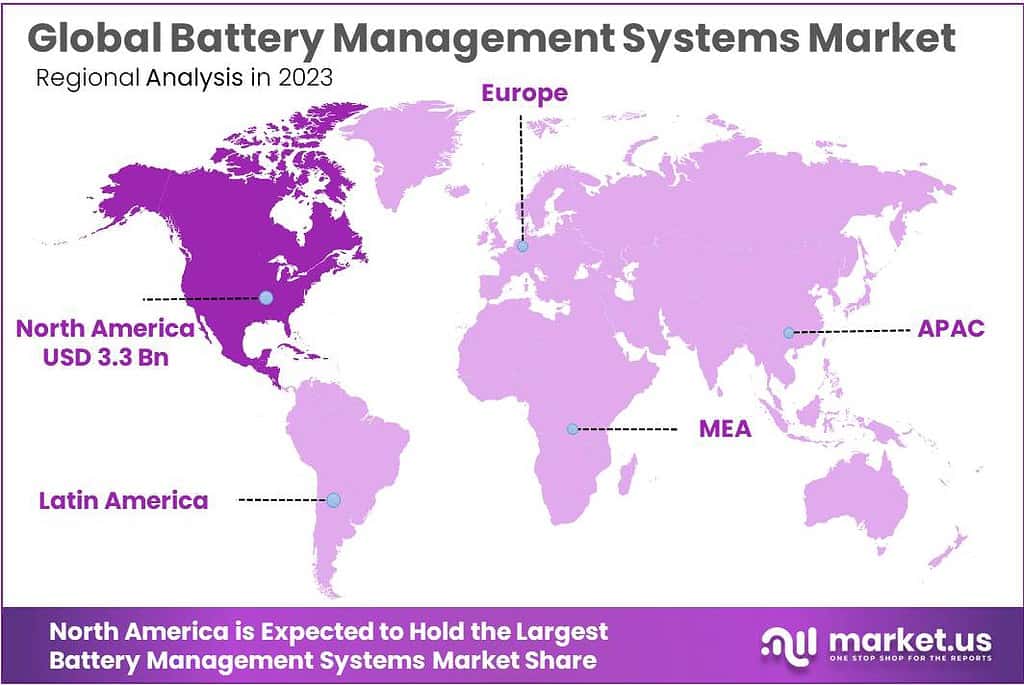Battery Management Systems Market By Battery Type(Lead acid battery, Lithium-ion battery, Nickel battery, Flow battery, Others), By Topology(Centralized, Modular, Distributed, By Application(Automotives, Consumer electronics, Energy storage, Telecom, Healthcare, Renewable, Military and defense), By Region, and Key Companies - Industry Segment Outlook, Market Assessment, Competition Scenario, Trends and Forecast 2024-2033
- Published date: March 2024
- Report ID: 115975
- Number of Pages: 236
- Format:
-
keyboard_arrow_up
Quick Navigation
Report Overview
The global Battery Management Systems Market size is expected to be worth around USD 61.9 billion by 2033, from USD 8.9 billion in 2023, growing at a CAGR of 21.4% during the forecast period from 2023 to 2033.
A Battery Management System (BMS) is an electronic system that monitors and manages the performance, efficiency, and safety of rechargeable batteries. It controls and safeguards various aspects of battery operation, including charging, discharging, and balancing, to ensure optimal functionality, extend battery life, and prevent potential hazards such as overcharging or overheating.
The BMS is commonly used in various applications, ranging from electric vehicles and renewable energy systems to consumer electronics and industrial energy storage, providing crucial insights and control mechanisms for the effective utilization of battery packs.

Key Takeaways
- Market Growth: BMS market set to skyrocket from USD 8.9 billion (2023) to USD 61.9 billion (2033) at a CAGR of 21.4%.
- Lead Acid Dominance: Lead acid batteries lead with 48.6% market share, prized for reliability and cost-effectiveness.
- Consumer Electronics Lead: Consumer electronics command over 42.3% market share in BMS applications.
- Regional Dynamics: North America leads in revenue, driven by energy costs and diverse sector demands; Europe, notably Germany, sustains growth.
By Battery Type
In 2023, Lead Acid Battery dominated the Battery Management Systems (BMS) Market, securing a prominent market share of over 48.6%. This substantial presence underscores the continued significance of lead acid batteries in various applications, ranging from automotive and industrial to uninterruptible power supply (UPS) systems.
Lead Acid Battery: Lead acid batteries, renowned for their reliability and cost-effectiveness, retained a dominant position in 2023. Widely used in automotive applications and backup power systems, the market share reflects their enduring popularity. BMS for lead acid batteries plays a crucial role in optimizing performance, preventing overcharging, and ensuring safe operation, contributing to their sustained market leadership.
Lithium Ion Battery: Following closely, Lithium Ion batteries held a significant market share. The demand for BMS in lithium-ion batteries is driven by their widespread use in portable electronics, electric vehicles, and renewable energy storage systems. As a preferred choice for high-energy-density applications, BMS enhances the safety and efficiency of lithium-ion batteries, supporting their increasing adoption.
Nickel Battery: Nickel batteries maintained a notable presence, particularly in niche applications. BMS for nickel batteries addresses specific charging and discharging characteristics, ensuring optimal performance. While their market share is comparatively smaller, nickel batteries cater to select industries, including aerospace and medical devices, where their unique properties are advantageous.
Flow Battery: In the BMS Market, Flow Batteries showcased a growing but niche segment. With applications in large-scale energy storage and grid-level projects, flow batteries offer advantages in terms of scalability and long cycle life. BMS tailored for flow batteries plays a critical role in managing their unique characteristics, contributing to their emerging market position.
By Topology
In 2023, Centralized topology dominated the Battery Management Systems (BMS) Market, commanding a significant market share of over 44.6%. This indicates the prevailing preference for centralized BMS architecture in managing and optimizing the performance of rechargeable batteries across various applications.
Centralized Topology: Centralized BMS took the lead in 2023, holding a robust market position. This architecture involves a single control unit overseeing the entire battery pack. Widely adopted for its simplicity and cost-effectiveness, centralized BMS enables efficient monitoring and control of battery parameters. Its dominance signifies its effectiveness in applications where a unified and centralized approach to battery management is crucial, such as in electric vehicles and large-scale energy storage systems.
Modular Topology: Following closely, Modular BMS maintained a substantial market share. This approach involves dividing the battery pack into modular units, each equipped with its BMS. This modular architecture offers flexibility, scalability, and the ability to replace or upgrade individual modules. The market share highlights the appeal of modular BMS in applications requiring adaptability and ease of maintenance, often found in grid energy storage and industrial settings.
Distributed Topology: Distributed BMS exhibited a notable presence, especially in specific niche applications. In this topology, each battery cell or module has its BMS, working collaboratively. Distributed BMS is valued for its ability to provide precise control at the individual cell level, enhancing safety and performance. Although its market share is comparatively smaller, distributed BMS finds relevance in applications demanding granular control, such as in aerospace and certain medical devices.

By Application
In 2023, Consumer Electronics emerged as the frontrunner in the Battery Management Systems (BMS) Market, commanding a substantial market share of over 42.3%. This dominance signifies the critical role of BMS in enhancing the performance and safety of batteries used in a wide range of consumer electronic devices.
Consumer Electronics: Consumer electronics took the lead in 2023, holding a significant market share. BMS in consumer electronics ensures optimal battery performance, longevity, and safety in devices such as smartphones, laptops, and wearable gadgets. The dominance of this segment reflects the pervasive integration of rechargeable batteries in everyday tech products and the increasing focus on battery management for improved user experience.
Automotives: Following closely, the Automotive segment maintained a robust presence in the BMS Market. With the rising adoption of electric vehicles (EVs) and hybrid cars, BMS plays a crucial role in managing complex battery systems in automotive applications. The market share underscores the increasing importance of BMS in ensuring the efficiency, longevity, and safety of batteries powering modern vehicles.
Energy Storage: Energy Storage emerged as a significant application, showcasing the growing importance of BMS in managing batteries used for storing renewable energy. BMS in energy storage systems optimizes charging, discharging, and overall performance, contributing to grid stability and the integration of renewable sources.
Telecom: The Telecom sector maintained a notable market presence, reflecting the reliance on batteries for backup power in telecommunication infrastructure. BMS ensures the reliability of batteries in telecom applications, preventing issues like overcharging or discharging and enhancing the overall resilience of communication networks.
Healthcare: In the Healthcare segment, BMS played a vital role in ensuring the reliable operation of batteries used in medical devices. The market share highlights the criticality of BMS in healthcare applications, where battery-powered equipment demands precision, consistency, and safety.
Renewable: The Renewable Energy segment exhibited a growing market share, emphasizing the role of BMS in managing batteries connected to solar and wind energy systems. BMS optimization contributes to the efficiency and reliability of renewable energy storage, supporting the transition to sustainable energy solutions.
Military and Defense: The Military and Defense sector showcased a significant presence in the BMS Market. BMS in this application ensures the performance and reliability of batteries used in critical defense equipment, aligning with stringent safety and operational requirements.
Market Key Segments
By Battery Type
- Lead acid battery
- Lithium-ion battery
- Nickel battery
- Flow battery
- Others
By Topology
- Centralized
- Modular
- Distributed
By Application
- Automotives
- Consumer electronics
- Energy storage
- Telecom
- Healthcare
- Renewable
- Military and defense
Drivers
Rapid Growth in Electric Vehicles (EVs):
The surge in the adoption of electric vehicles is a major driver for the Battery Management Systems (BMS) Market.
As the automotive industry undergoes a paradigm shift towards electrification, BMS plays a crucial role in managing the complex battery systems in EVs. It ensures optimal performance, longevity, and safety, addressing concerns such as thermal management and cell balancing.
Increasing Demand for Renewable Energy Storage:
The global push towards renewable energy sources contributes significantly to the growth of the BMS Market.
BMS is essential for managing batteries in renewable energy storage systems, optimizing charging and discharging cycles, and ensuring the reliability of stored energy. The growing emphasis on sustainable energy solutions amplifies the demand for BMS in grid-level energy storage and off-grid applications.
Restraints
Stringent Regulatory Compliance:
A significant restraint in the BMS Market is the need to comply with stringent regulatory standards.
Compliance with safety standards and environmental regulations requires substantial investments in technology and infrastructure. Navigating complex regulatory landscapes poses challenges for market players, particularly smaller entities, impacting their ability to enter or compete effectively in the BMS Market.
Supply Chain Disruptions:
The BMS Market is susceptible to supply chain disruptions, impacting the timely and reliable supply of components.
Factors such as geopolitical tensions, natural disasters, or logistical challenges can disrupt the procurement of essential materials, affecting the production and delivery of BMS solutions. Such uncertainties necessitate strategic measures to enhance supply chain resilience.
Opportunity
Growing Telecommunication Infrastructure:
The expansion of telecommunication networks presents a significant opportunity for the BMS Market.
BMS ensures the reliability of batteries used for backup power in telecom infrastructure, preventing issues like overcharging or discharging. As telecommunication networks continue to grow, the demand for BMS in this sector is expected to rise, providing new avenues for market expansion.
Advancements in Wearable Technology:
The increasing popularity of wearable devices creates a substantial opportunity for BMS applications.
BMS contributes to enhancing the performance and safety of batteries in wearable technology, addressing the specific requirements of compact and energy-efficient devices. As wearable technology evolves, BMS innovation can play a pivotal role in meeting the demands of this dynamic market.
Trends
Integration of Artificial Intelligence (AI) and Machine Learning (ML):
A prominent trend in the BMS Market is the integration of AI and ML for advanced battery analytics.
AI and ML algorithms enhance the capabilities of BMS by predicting battery behavior, optimizing charging patterns, and identifying potential issues before they escalate. This trend aligns with the industry’s pursuit of smart and adaptive energy management solutions.
Emphasis on Modular and Scalable Architectures:
The trend towards modular and scalable BMS architectures is gaining momentum.
This approach allows for flexibility in adapting BMS to different battery chemistries and applications. Manufacturers are increasingly focusing on modular designs to simplify maintenance, upgrades, and integration across various sectors, including electric vehicles, renewable energy, and consumer electronics.
Regional Analysis
In 2023, North America emerged as the leading revenue contributor, capturing a substantial share exceeding 36.8%. This dominance is driven by the escalating energy costs and the volatile nature of petrochemical prices, spurring an increased demand for biofuels.
The region’s growth in the Battery Management Systems (BMS) Market is further propelled by rising demands from diverse end-use sectors, including construction, electronics, electrical appliances, furniture, and interiors.
In the European landscape, Germany stands out as a crucial hub for the automotive industry. With its prominence as the leading European producer of passenger vehicles, accounting for more than 30% of the EU member countries, Germany plays a pivotal role in sustaining market growth throughout the forecast period.
The production of natural oils polyol is set to benefit from low manufacturing costs and the robust expansion of the manufacturing sector. The strategic move of major international companies to enhance their regional production capacity adds strength to the production landscape of the regional market.

Key Regions and Countries
- North America
- The US
- Canada
- Mexico
- Western Europe
- Germany
- France
- The UK
- Spain
- Italy
- Portugal
- Ireland
- Austria
- Switzerland
- Benelux
- Nordic
- Rest of Western Europe
- Eastern Europe
- Russia
- Poland
- The Czech Republic
- Greece
- Rest of Eastern Europe
- APAC
- China
- Japan
- South Korea
- India
- Australia & New Zealand
- Indonesia
- Malaysia
- Philippines
- Singapore
- Thailand
- Vietnam
- Rest of APAC
- Latin America
- Brazil
- Colombia
- Chile
- Argentina
- Costa Rica
- Rest of Latin America
- Middle East & Africa
- Algeria
- Egypt
- Israel
- Kuwait
- Nigeria
- Saudi Arabia
- South Africa
- Turkey
- United Arab Emirates
- Rest of MEA
Key Players Analysis
The Battery Management Systems (BMS) market features several key players that play integral roles in shaping its dynamics.
Renowned companies such as Texas Instruments Incorporated, NXP Semiconductors N.V., and Analog Devices, Inc. are recognized for their extensive contributions to the semiconductor industry, offering innovative BMS solutions tailored for applications ranging from automotive to industrial sectors
Market Key Players
- Robert Bosch GmbH
- Panasonic corporation
- Toshiba Corp.
- Texas Instruments incorporated
- Ricardo
- Edition
- East Penn Manufacturing Company
- Mastervolt
- Lithium balance.
- Microchip Technology Inc.
- AVL
- Merlin Equipment
Report Scope
Report Features Description Market Value (2022) US$ 8.9 Bn Forecast Revenue (2032) US$ 61.9 Bn CAGR (2023-2032) 21.4% Base Year for Estimation 2022 Historic Period 2016-2022 Forecast Period 2023-2032 Report Coverage Revenue Forecast, Market Dynamics, COVID-19 Impact, Competitive Landscape, Recent Developments Segments Covered By Battery Type(Lead acid battery, Lithium-ion battery, Nickel battery, Flow battery, Others), By Topology(Centralized, Modular, Distributed, By Application(Automotives, Consumer electronics, Energy storage, Telecom, Healthcare, Renewable, Military and defense) Regional Analysis North America – The US, Canada, & Mexico; Western Europe – Germany, France, The UK, Spain, Italy, Portugal, Ireland, Austria, Switzerland, Benelux, Nordic, & Rest of Western Europe; Eastern Europe – Russia, Poland, The Czech Republic, Greece, & Rest of Eastern Europe; APAC – China, Japan, South Korea, India, Australia & New Zealand, Indonesia, Malaysia, Philippines, Singapore, Thailand, Vietnam, & Rest of APAC; Latin America – Brazil, Colombia, Chile, Argentina, Costa Rica, & Rest of Latin America; Middle East & Africa – Algeria, Egypt, Israel, Kuwait, Nigeria, Saudi Arabia, South Africa, Turkey, United Arab Emirates, & Rest of MEA Competitive Landscape Robert Bosch GmbH, Panasonic Corporation, Toshiba Corp., Texas Instruments Incorporated, Ricardo, Edition, East Penn Manufacturing Company, Mastervolt, Lithium balance., Microchip Technology Inc., AVL, Merlin Equipment Customization Scope Customization for segments, region/country-level will be provided. Moreover, additional customization can be done based on the requirements. Purchase Options We have three licenses to opt for: Single User License, Multi-User License (Up to 5 Users), Corporate Use License (Unlimited User and Printable PDF) Frequently Asked Questions (FAQ)
What is the size of Battery Management Systems Market?Battery Management Systems Market size is expected to be worth around USD 61.9 billion by 2033, from USD 8.9 billion in 2023
What is the CAGR for the Battery Management Systems Market?The Battery Management Systems Market expected to grow at a CAGR of 21.4% during 2023-2032.
Who are the key players in the Battery Management Systems Market?Robert Bosch GmbH, Panasonic corporation, Toshiba Corp., Texas Instruments incorporated, Ricardo, Edition, East Penn Manufacturing Company, Mastervolt, Lithium balance., Microchip Technology Inc., AVL, Merlin Equipment
 Battery Management Systems MarketPublished date: March 2024add_shopping_cartBuy Now get_appDownload Sample
Battery Management Systems MarketPublished date: March 2024add_shopping_cartBuy Now get_appDownload Sample -
-
- Robert Bosch GmbH
- Panasonic corporation
- Toshiba Corp.
- Texas Instruments incorporated
- Ricardo
- Edition
- East Penn Manufacturing Company
- Mastervolt
- Lithium balance.
- Microchip Technology Inc.
- AVL
- Merlin Equipment










